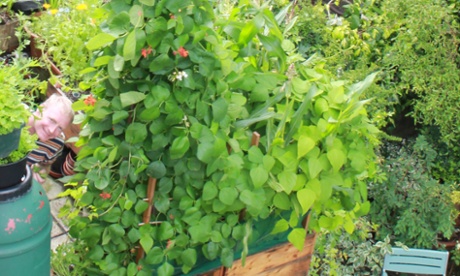
Ten years ago I used to chuck all of my food waste straight in the bin. There was no waste food collection where I lived in central London and, as I was living in a small flat with no garden, I thought composting my daily collection of used teabags, vegetable peelings and burnt toast was out of the question.
Then I discovered wormeries. They are perfect for small and garden-less homes because they need little space and make compost much faster than a compost bin once they are established.
Getting a wormery made me look at food waste in a new way. Browning apple cores and cabbage cut-offs, claggy coffee grounds and slimy scrapings from the bottom of the porridge pan: all were suddenly transformed into precious food for the worms. Looking back, I feel incredulous that I used to send it all to landfill without even thinking.
I have to admit to being ever so slightly evangelical about worms and wormeries.
They are truly miraculous things. In goes waste food, out comes new life: the best fertiliser you can get. Not only is it rich in nutrients and trace elements but also – unlike shop bought fertiliser – it is teeming with precious soil life: bacteria, fungi and nematodes. These microscopic creatures are the real magic of worm compost. They go to work in your pots, breaking down organic matter to release food for your plants, helping them to grow more vigorously and with greater resistance to pests.
There are lots of other good reasons to convert to the way of the worm. In the UK we throw away 7m tonnes of food every year, clogging up landfill and wasting a precious organic resource. Even in places where waste food is recycled, it still costs millions to collect waste food, compost it and then distribute the finished compost. Making your own worm compost allows you to make a personal contribution to reducing these costs, and to rescue some of this precious resource. Imagine if every home had a wormery, thereby eliminating the costs of food collection – and giving everyone access to a free fertiliser to grow their own organic vegetables!
It is easy to run a wormery if you follow a few simple rules:
Don’t feed a wormery too much food to begin with. Wormeries take time to establish. You start with a just few hundred worms, but a wormery operating at full power has several thousand. You need to wait patiently for your worms to multiply. They should double in number every three months – so after a year you will probably have over a thousand worms and increasing.
As the worm numbers increase, you can slowly feed it more. How do you know your worms need feeding? If you see a few worms scouting round on the surface when you open the lid, add a little more food. No worms on the surface, no more food. Simple. If in doubt, it's better to add too little than too much. Feed it too much, too soon and the food will go rancid and smelly.
• In addition to food waste you need to add 20-30% cardboard, paper or wood chip. Tear the card or paper into small pieces.
• Avoid adding large quantities of any one thing, particularly cooked or processed food. Worms like a balanced diet too. Little and often in is the best strategy.
• A healthy wormery does not smell bad. A whiffy wormery is usually either being fed too much food (solution: feed less) or not enough "brown stuff" – cardboard or wood chip (solution: add more).
• You can find a more complete menu for worms here:
Worms are simple things. They will be happy in any home that meets their basic needs: air, darkness and moisture. They don’t like to get too hot so avoid placing your wormery in full sun. You don’t want to boil them.
Your own needs may be more complex. If it’s important that your wormery is aesthetically pleasing or discretely hidden away, you can buy beautiful wooden wormeries that double up as garden benches (square wormeries fit more neatly into small spaces than round ones). If you only have room for a wormery inside, you can buy sealed plastic can wormeries.
Are you a bit squeamish about worms? You can buy a wormery with tiers so you can harvest the compost without touching the worms. Don’t want to spend too much on it? Your council may offer subsidised wormeries, or you can make make your own wormery for almost nothing out of wood or a plastic box. Find out how here.
There’s no excuse not to join me in this new wriggly religion. Wormeries do require a bit of patience to get started, but otherwise they are low maintenance and will reward you for many years to come with a free supply of fine fertiliser. Not to mention the satisfaction of knowing that you are transforming waste into something useful. You may even find you become quite friendly with their inhabitants too.
More about feeding plants in pots and how to use worm compost soon. Next up: the best edible flowers for containers and how to grow them.
Interested in finding out more about how you can live better? Take a look at this month's Live Better Challenge here.
The Live Better Challenge is funded by Unilever; its focus is sustainable living. All content is editorially independent except for pieces labelled advertisement feature. Find out more here.

